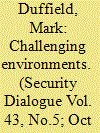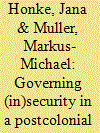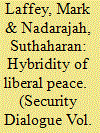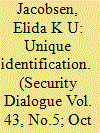|
|
|
Sort Order |
|
|
|
Items / Page
|
|
|
|
|
|
|
| Srl | Item |
| 1 |
ID:
117608


|
|
|
|
|
| Publication |
2012.
|
| Summary/Abstract |
Despite the widespread perception of danger, the aid industry continues to expand within challenging political environments. As a way of reducing risk, this expansion has been accompanied by the 'bunkerization' of international aid workers. While this development is largely viewed by the industry as an unfortunate response to a decline in external security, a more holistic approach is used here to explain the consequent paradox of liberal interventionism: an expansion that is simultaneously a remoteness of international aid workers from the societies in which they operate. The demise of modernist legal, moral and political constraints, together with a decline in the political patronage that aid agencies enjoy, has been important in shaping the new risk terrain. At the same time, these changes embody a profound change in the way contingency is approached. Earlier modernist forms of protection have been replaced by postmodernist calls for resilience and the acceptance of risk as an opportunity for enterprise and reinvention. Within the aid industry, however, field-security training represents a countervailing attempt to govern aid workers through anxiety. Resilience, in the form of 'care of the self' techniques, becomes a therapeutic response to the fears induced in this way. Viewed from this perspective, apart from reducing risk, the bunker has important therapeutic functions in a world that aid workers no longer understand or feel safe in.
|
|
|
|
|
|
|
|
|
|
|
|
|
|
|
|
| 2 |
ID:
117603


|
|
|
|
|
| Publication |
2012.
|
| Summary/Abstract |
While analysis of transnationalized forms of security governance in the contemporary postcolonial world features prominently in current debates within the field of security studies, most efforts to analyse and understand the relevant processes proceed from an unquestioned 'Western' perspective, thereby failing to consider the methodological and theoretical implications of governing (in)security under postcolonial conditions. This article seeks to address that lacuna by highlighting the entangled histories of (in)security governance in the (post)colonial world and by providing fresh theoretical and methodological perspective for a security studies research agenda sensitive to the implications of the postcolonial condition.
|
|
|
|
|
|
|
|
|
|
|
|
|
|
|
|
| 3 |
ID:
117604


|
|
|
|
|
| Publication |
2012.
|
| Summary/Abstract |
Much contemporary analysis of world order rests on and reproduces a dualistic account of the international system, which is divided into liberal and non-liberal spaces, practices and subjectivities. Drawing on postcolonial thought, we challenge such dualisms in two ways. First, we argue that, as a specific form of governmental reason and practice produced at the intersection of the European and the non-European worlds, liberalism has always been hybrid, encompassing within its project both 'liberal' and 'non-liberal' spaces and practices. Second, through analysis of liberal engagement with diasporas, a specific set of subjects that occupy both these spaces, we show how contemporary practices of transnational security governance work to reproduce the hybridity of liberal peace. The article demonstrates the shifting conditions for local agency in relations and practices that transcend the simple dualism between liberal and non-liberal spaces, in the process showing how practices of transnational security governance also reproduce diasporas as hybrid subjects. The argument is illustrated with reference to the Tamil diaspora and the Sri Lankan state's war against the Liberation Tigers of Tamil Eelam.
|
|
|
|
|
|
|
|
|
|
|
|
|
|
|
|
| 4 |
ID:
117606


|
|
|
|
|
| Publication |
2012.
|
| Summary/Abstract |
This article contributes to the analysis of transnationalized forms of security governance in the postcolonial world by looking into the production of knowledge aimed at increasing coherence between domains of security and development in Western donor policies. The article takes an ethnographic approach to the analysis of knowledge production, using the author's personal experience of writing a policy analysis for a donor government concerning how to 'further improve' the policy of 'concerted civil-military planning and action'. This attempt to 'study up' and analyse upstream practices involved in transnational security governance shows the degree to which policy-related knowledge production is a negotiated, social process that involves informal practices and defensive tactics. The policy process seems to be less concerned with effects on the ground than with the problem of creating unity among the wide range of agents and institutions involved in the emerging policy field. While such an approach may have potentially destabilizing effects - both for policy narratives and for researchers' authority - it responds to calls for reflections on the politics of representation and writing in studies of international relations.
|
|
|
|
|
|
|
|
|
|
|
|
|
|
|
|
| 5 |
ID:
117605


|
|
|
|
|
| Publication |
2012.
|
| Summary/Abstract |
In September 2009, Canadian Prime Minister Stephen Harper declared to the global media that Canada had 'no history of colonialism'. Such expressions of the post-colonial Canadian imaginary are common, despite Canada's dubious legacy of settler colonialism. This article uses Canada's Access to Information Act to examine how mechanisms of security are mobilized against members of the Algonquins of Barriere Lake (ABL), whose persistent calls for sovereign control of their land and customary governance system have been translated by Canadian authorities into a security threat to settler society. Contributing to the literature on postcolonialism, as well as works on critical security studies and colonial governmentality, this article suggests that distinct rationalities underline colonial activities in settler states. The authors contend that the term 'settler governmentality' is more appropriate for settler states such as Canada, and they present the case study of the ABL to argue that (in)security governance of indigenous groups in Canada incorporates techniques that are necessarily grounded in a logic of elimination. The authors detail how an analysis of the interventions in the traditional governance of the ABL contributes to understanding recent security trends regarding 'Aboriginal extremism' and indigenous 'hot spot' areas in Canada, which are often framed as matters of 'national security'.
|
|
|
|
|
|
|
|
|
|
|
|
|
|
|
|
| 6 |
ID:
117607


|
|
|
|
|
| Publication |
2012.
|
| Summary/Abstract |
The last decade has seen an increased focus on secured forms of identification in security governance, leading to a massive growth and standardization in the application of biometric technologies globally. This article examines what is currently the largest biometric technology project in the world: the nationwide Unique Identification (UID) number system in India. It emphasizes the importance of investigating the postcolonial contexts of governance in which biometric technology is currently being applied. Approaching the Indian scheme as a discursive/practical assemblage of multiple actors and rationales, the article investigates three contexts within which the biometric project emerged: India's Home Ministry, the Unique Identification Authority of India and a project focusing on the biometric identification of homeless people in Delhi. In particular, the article examines the various targets of intervention constructed in the discourses and practices of the national ID scheme. It is argued that the practice of biometric identification is produced as a solution to a wide array of problems of governance, both as a means of financial inclusion and as a method of surveillance.
|
|
|
|
|
|
|
|
|
|
|
|
|
|
|
|
|
|
|
|
|